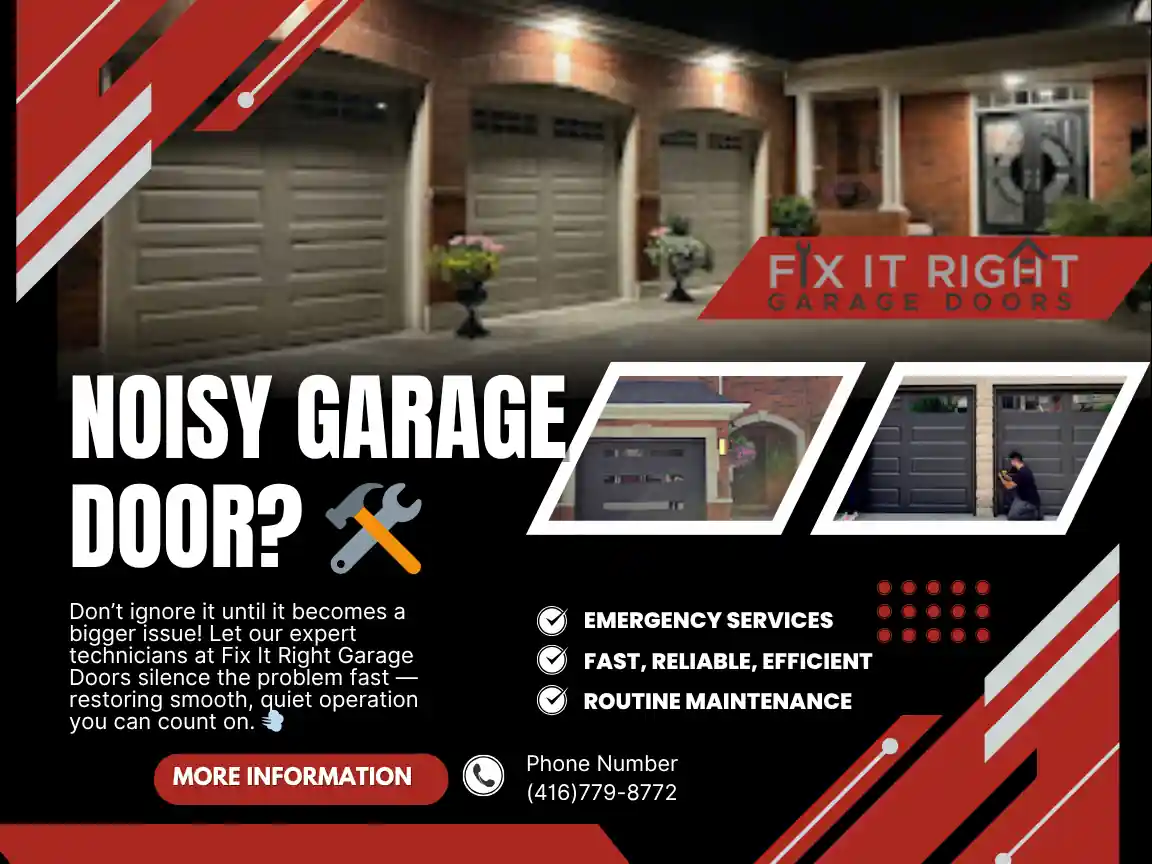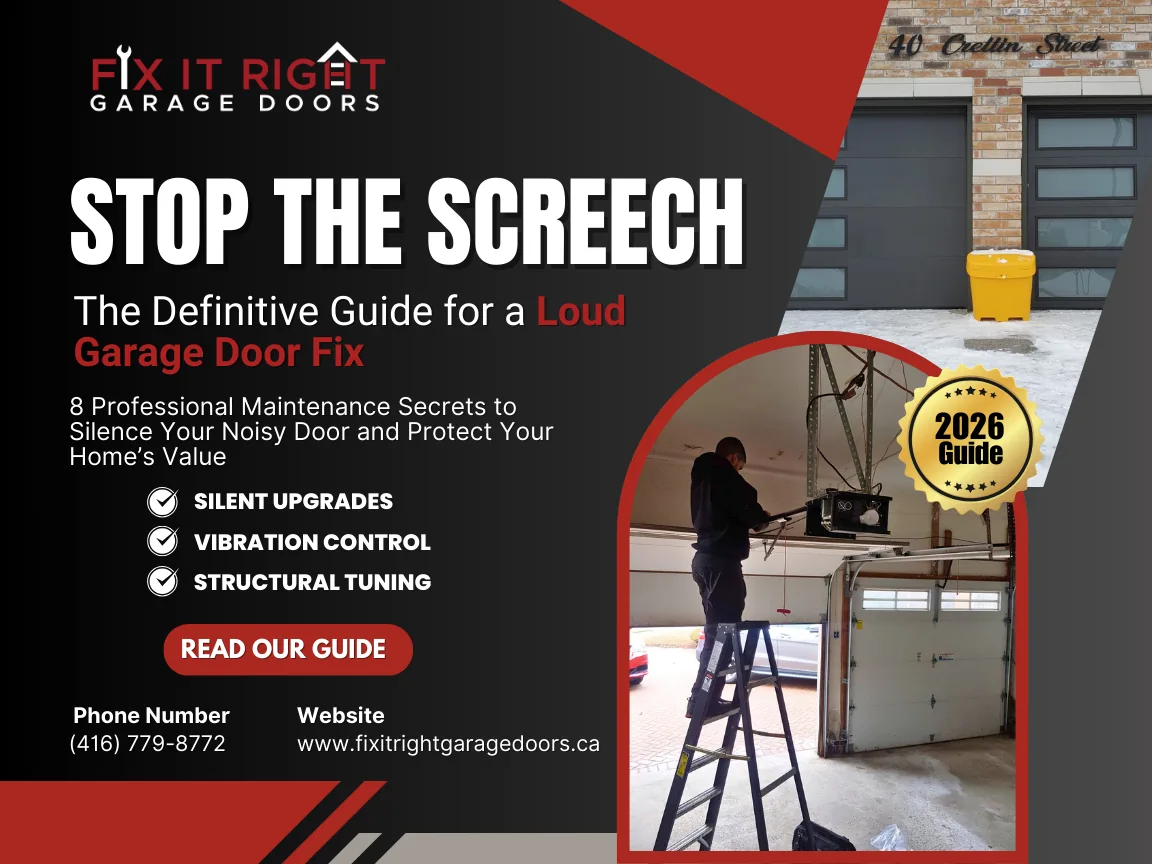Is the cacophony of your noisy garage door waking the entire household every morning? Does its symphony of squeaks, grinding, scraping, and rattling send shivers down your spine? You’re not alone! A loud garage door is a common nuisance for many homeowners, and while it might seem like a minor annoyance, it often signals underlying issues that, if left unaddressed, could lead to more significant and costly repairs.
Beyond the disturbance, a noisy garage door is essentially your garage door crying out for attention. It’s telling you that something isn’t quite right within its intricate system of springs, rollers, tracks, and the opener itself. Ignoring these sounds can result in accelerated wear and tear, reduced lifespan of components, and potentially a complete system breakdown.
In this comprehensive guide, we’ll delve deep into the common causes of a noisy garage door, explore practical DIY troubleshooting steps, and highlight when it’s absolutely essential to call a professional for issues like a noisy garage door opener, squeaky garage door springs, or garage door grinding noise. We’ll also provide tips on how to prevent future noise, ensuring your garage door operates with the quiet dignity it deserves.
Understanding the Anatomy of a Noisy Garage Door
To effectively quiet your garage door, it helps to understand the main components that contribute to its operation and, consequently, its noise output. Each part can produce a distinct sound when malfunctioning:
- Rollers: These wheels guide the door along the tracks. Worn-out, flat-spotted, or unlubricated rollers (especially steel ones) are prime suspects for squeaking, grinding, and clanking.
- Tracks: The metal channels that the rollers run inside. Debris, dents, or misalignment can cause scraping or grinding.
- Hinges: Connect the garage door panels and hold the rollers. Loose, rusty, or unlubricated hinges can squeak and creak.
- Springs (Torsion or Extension): These counterbalance the door’s weight. Dry, unlubricated springs can groan, squeak, or creak loudly. Broken springs will lead to a very loud bang and prevent operation.
- Cables: Work with springs to lift and lower the door. Frayed or improperly seated cables can cause grinding or snapping sounds.
- Garage Door Opener: The motorized unit itself. The motor, chain/belt, or internal gears can produce grinding, clunking, or humming noises.
- Loose Hardware: Bolts, nuts, and screws can loosen over time due to vibration, causing rattling.
Common Causes of a Noisy Garage Door (And How to Identify Them) 🕵️
Let’s break down the most frequent culprits behind a noisy garage door and the specific sounds they make:
- Lack of Lubrication (Squeaking, Creaking, Grinding):
- The Culprit: This is the most common and easiest fix for a noisy garage door. Moving metal parts – rollers, hinges, and springs – require regular lubrication to reduce friction. Over time, factory lubricants wear off, and rust or dirt can accumulate.
- Sounds: Often described as a high-pitched squeak, a deeper creak, or a dry grinding sound, especially when the door starts or stops.
- DIY Fix: Apply a high-quality, silicone-based or lithium grease garage door lubricant (never WD-40, which is a degreaser) to:
- Rollers: Lubricate the bearings where the roller stem meets the wheel. If you have nylon rollers with sealed bearings, lubricate the stem where it enters the hinge.
- Hinges: Lubricate the hinge pivots.
- Springs: Lightly spray the entire length of both torsion (above the door) or extension (along the tracks) springs.
- Caution: DO NOT lubricate the garage door tracks. Lubricant attracts dirt, creating a gummy mess that impedes roller movement. Keep tracks clean and dry.
- Worn-Out or Damaged Rollers (Grinding, Clanking, Jerking):
- The Culprit: The garage door rollers are constantly working. Plastic or old steel rollers can wear down, flatten, crack, or rust, causing friction and uneven movement. This often results in a garage door grinding noise.
- Sounds: A rough grinding, clicking, or clanking sound as the door moves. The door might also appear to jerk or shudder.
- What to Check: Visually inspect each roller. Look for:
- Flat spots on the wheels.
- Cracks or chips in plastic or nylon rollers.
- Excessive rust on steel rollers.
- Worn bearings (the wheel wobbles excessively on its stem).
- DIY Fix (Limited): If only one or two rollers are mildly damaged and easily accessible (especially if the door is open and secured), you might attempt replacement. However, be extremely cautious, especially with bottom rollers which are under high spring tension.
- When to Call a Pro: If multiple rollers are worn, if the bottom rollers are damaged, or if you’re not comfortable with the replacement process. Upgrading to nylon garage door rollers with sealed ball bearings is a great way to significantly reduce noise long-term.
- Loose Hardware (Rattling, Clunking):
- The Culprit: Vibration from constant door operation can loosen nuts, bolts, and screws on hinges, track brackets, and the opener mounting.
- Sounds: A general rattling, clunking, or buzzing sound, particularly noticeable when the door starts or stops.
- DIY Fix: Using a socket wrench and screwdriver, carefully go over all visible nuts and bolts on the hinges, track brackets, and the opener’s mounting hardware. Tighten them firmly but avoid overtightening, which can strip threads or warp components.
- Misaligned or Bent Tracks (Scraping, Grinding, Binding):
- The Culprit: If the vertical or horizontal garage door tracks are not perfectly aligned, or if they have become bent or dented, the rollers will scrape against them, causing significant friction and noise. This is a common source of a loud garage door grinding noise. Impacts, loose mounting brackets, or even house settling can cause this.
- Sounds: A harsh scraping, grinding, or loud rubbing sound as the door moves. The door might also bind or get stuck.
- What to Check:
- Stand inside the garage and visually inspect the tracks from top to bottom. They should be parallel and plumb.
- Look for visible bends, dents, or gaps where the rollers might be catching.
- DIY Fix (Limited): For minor bends, you might be able to gently tap them back into place with a rubber mallet and a block of wood. For loose track bolts, tighten them.
- When to Call a Pro: If tracks are significantly bent, severely misaligned, or if the door is garage door off track. This is a dangerous situation and requires professional expertise to safely realign or replace the tracks.
- Noisy Garage Door Opener (Humming, Grinding, Clicking):
- The Culprit: The opener itself can be a source of noise, particularly older chain-drive models or those with internal mechanical issues. A noisy garage door opener can stem from several parts.
- Sounds:
- Loud Humming/Buzzing: Often indicates motor straining or worn internal gears.
- Grinding/Clicking: Worn gears, a loose chain/belt, or a malfunctioning trolley.
- Excessive Vibration: Opener mounting might be loose.
- What to Check:
- Chain/Belt: Inspect the chain or belt on your opener. Is it properly tensioned (not too loose, not too tight)? Lubricate chain drives if applicable (some belts are maintenance-free).
- Mounting: Check if the opener unit is securely mounted to the ceiling. Tighten any loose bolts.
- Internal Components: If the motor itself is grinding or struggling, it could be worn gears or a failing motor.
- DIY Fix: Tighten mounting bolts, lubricate the chain (if applicable). Consult your opener manual for adjusting chain/belt tension.
- When to Call a Pro: If the motor is making grinding noises, if the opener sounds like it’s struggling even after other components are lubricated, or if you suspect internal mechanical failure.
- Squeaky Garage Door Springs (Creaking, Groaning):
- The Culprit: Both torsion springs (mounted above the door) and extension springs (running parallel to the tracks) can become dry and noisy over time. These are under extreme tension.
- Sounds: A loud, deep creaking or groaning sound as the door opens and closes, often originating from the spring assembly.
- DIY Fix: Lightly spray the entire length of the springs with a garage door lubricant.
- When to Call a Pro: If a spring is broken (you’ll hear a loud “bang,” and the door will be extremely heavy), or if lubrication doesn’t resolve the squeaking. Never attempt to repair or replace springs yourself.


Troubleshooting Table for Your Noisy Garage Door
Here’s a quick reference guide to help pinpoint the noise source:
| Noise Type | Common Cause(s) | DIY Action (if safe) | When to Call a Professional 🚨 |
|---|---|---|---|
| Squeaking, Creaking | Dry rollers, hinges, or springs; loose hinges. | Lubricate rollers, hinges, springs (not tracks!); tighten loose hinge bolts. | If noise persists after lubrication; if springs are broken or show severe wear. |
| Grinding, Scraping | Worn garage door rollers; misaligned/bent garage door tracks; debris in tracks. | Clean tracks; inspect and clean rollers; gently tap minor track bends. | If rollers are severely worn/broken; if tracks are significantly bent/misaligned; if door is off track; if garage door grinding noise is constant. |
| Rattling, Clunking | Loose nuts/bolts on hinges, track brackets, opener mounting. | Inspect and tighten all visible fasteners on hinges, track brackets, and opener mounting. | If tightening doesn’t resolve; if mounting points are damaged; if internal opener components are rattling. |
| Loud Humming/Buzzing | Noisy garage door opener motor straining; loose chain/belt. | Lubricate opener chain (if applicable); ensure proper chain/belt tension; tighten opener mounting bolts. | If motor still hums/strains; if internal gears are grinding; if opener is old and consistently loud. |
| Loud Bang/Door Won’t Move | Broken spring (torsion or extension); snapped cable. | DO NOT operate door or attempt repair. Visually confirm broken spring/cable. Disconnect opener. | Immediately call a professional. This is extremely dangerous. |
Export to Sheets
Preventing a Noisy Garage Door: The Power of Proactive Maintenance
The best way to deal with a noisy garage door is to prevent it from becoming noisy in the first place! Regular, proactive maintenance can keep your system running smoothly and quietly for years.
- Annual Professional Inspection & Tune-Up: This is paramount. A professional technician will:
- Thoroughly inspect all components (springs, cables, rollers, hinges, tracks, opener).
- Lubricate all necessary moving parts correctly.
- Check and adjust spring tension.
- Ensure tracks are properly aligned and free of debris.
- Test safety features (like the auto-reverse sensors).
- Identify worn parts (like rollers) before they become a broken garage door roller causing significant noise or failure.
- This can address potential issues before they develop into a loud noisy garage door opener or other frustrating sounds.
- DIY Monthly Visual Check-Ups:
- Watch your door operate. Is it smooth and quiet?
- Listen for any new or unusual sounds.
- Quickly scan for loose bolts, debris in tracks, or visible wear on rollers/springs.
- Regular Lubrication (Every 3-6 Months): As detailed above, consistent and correct lubrication is key. Use high-quality garage door lubricant.
- Clean Tracks: Regularly wipe down the inside of your tracks to prevent accumulation of dirt and grime.
For more detailed information on garage door maintenance, you can check out resources from the International Door Association (IDA): https://www.doors.org/ or the Door & Access Systems Manufacturers Association (DASMA): https://www.dasma.com/.
When to Call the Pros for Your Noisy Garage Door
While many minor noise issues can be resolved with DIY lubrication and tightening, there are critical situations where professional intervention is not just recommended, but essential for safety and effective repair.
- Broken Springs or Cables: As mentioned, these are extremely dangerous components. Never attempt to work on them yourself.
- Garage Door Off Track: A door that has come off its tracks is unstable and poses a serious risk of falling.
- Significant Track Damage: If your garage door tracks are severely bent, warped, or you suspect a structural issue, professional realignment or replacement is needed.
- Persistent Grinding or Loud Noises After DIY Efforts: If you’ve lubricated everything and tightened all hardware, and the noise (especially a garage door grinding noise) persists, it indicates a deeper mechanical problem that requires expert diagnosis. This could be worn gears in the opener, internal component failure, or deeper issues with rollers or hinges not visible to the untrained eye.
- Noisy Garage Door Opener Issues: If the noise seems to originate directly from the opener unit itself (beyond simple chain lubrication), especially if it’s struggling or making alarming sounds, it’s best to have a professional inspect it.
- Anytime You Feel Unsafe: If you are unsure about any step or feel uncomfortable performing a repair, it’s always safer to call a qualified garage door technician.
Living in the GTA, our garage doors endure a range of temperatures and humidity, which can accelerate wear and tear, leading to more frequent noise issues. Having a local, experienced professional ensures quick and reliable service. For further information or to book a service appointment for your noisy garage door, please give us a call! We’re here to help get your garage door running quietly and safely again. 📞
Conclusion: Enjoy the Sound of Silence!
A noisy garage door isn’t just an irritating sound; it’s a warning signal from your home’s largest moving component. By understanding the common culprits – from dry rollers and squeaky garage door springs to a noisy garage door opener or an unfortunate garage door grinding noise – you can often take proactive steps to silence the din. However, always prioritize safety and know when to trust the expertise of professionals, especially for complex or dangerous repairs. Investing a little time and attention (or a professional service call) into your garage door today will ensure years of quiet, smooth, and reliable operation. Enjoy the sound of silence! 😌🚪









